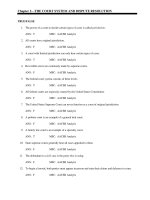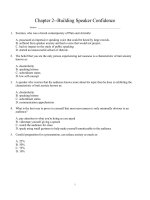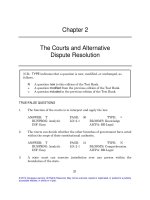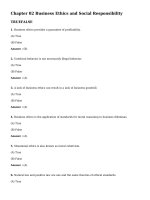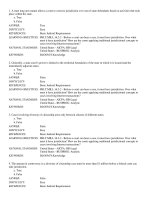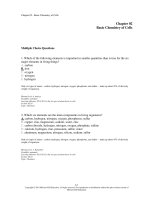Cengage advantage books foundations of the legal environment of business 3rd edition jennings test bank
Bạn đang xem bản rút gọn của tài liệu. Xem và tải ngay bản đầy đủ của tài liệu tại đây (86.33 KB, 28 trang )
Chapter 02 Business Ethics and Social Responsibility
TRUEFALSE
1. Business ethics provides a guarantee of profitability.
(A) True
(B) False
Answer : (B)
2. Unethical behavior is not necessarily illegal behavior.
(A) True
(B) False
Answer : (A)
3. A lack of business ethics can result in a lack of business goodwill.
(A) True
(B) False
Answer : (A)
4. Business ethics is the application of standards for moral reasoning to business dilemmas.
(A) True
(B) False
Answer : (A)
5. Situational ethics is also known as moral relativism.
(A) True
(B) False
Answer : (A)
6. Natural law and positive law are one and the same theories of ethical standards.
(A) True
(B) False
Answer : (B)
7. Milton Friedman's standard for business social responsibility is one that requires a company to do
all that it can for its community.
(A) True
(B) False
Answer : (B)
8. Waiting your turn, while not a statute, is typically an ordinance.
(A) True
(B) False
Answer : (B)
9. Natural law, unlike other rules, does not change.
(A) True
(B) False
Answer : (A)
10. An employee's actions away from the job has no relevance to his or her employer.
(A) True
(B) False
Answer : (B)
11. A company, such as Nike, can have no affect on the work environment in a foreign country.
(A) True
(B) False
Answer : (B)
12. Giving a false impression, although not actually an untruth, is still an ethical violation.
(A) True
(B) False
Answer : (A)
13. A code of ethics is an individual firm's behavior standard for employees.
(A) True
(B) False
Answer : (A)
14. A company with a code of ethics has no further concern with regard to the tone at the top for the
ethical behavior of the company's employees.
(A) True
(B) False
Answer : (B)
15. Condoning unethical behavior is an ethical breach.
(A) True
(B) False
Answer : (A)
16. A government employee releasing personal tax information about an individual is an ethical
breach.
(A) True
(B) False
Answer : (A)
17. The "front page of the newspaper test" is an application of whether conduct gives the
appearance of impropriety.
(A) True
(B) False
Answer : (A)
18. The first question of the Blanchard/Peale model for resolving ethical dilemmas is whether the
conduct is legal.
(A) True
(B) False
Answer : (A)
19. Whether everyone else does it is one method for evaluating the ethics of a particular course of
action.
(A) True
(B) False
Answer : (B)
20. "I was just following orders," is a defense in law and a test for ethical behavior.
(A) True
(B) False
Answer : (B)
21. A relativist asks why someone is engaged in unethical or illegal conduct before determining
whether the conduct is right or wrong.
(A) True
(B) False
Answer : (A)
22. "That's the way it has always been done," is a phrase that often signals ethical difficulties.
(A) True
(B) False
Answer : (A)
23. The first question of the Wall Street Journal model is whether the conduct complies with the law.
(A) True
(B) False
Answer : (A)
24. In the Parable of the Sadhu, the hikers are certain the religious pilgrim survived.
(A) True
(B) False
Answer : (B)
25. In the Parable of the Sadhu, the hikers' climb is successful.
(A) True
(B) False
Answer : (A)
26. Ethics can provide a strategic advantage for companies.
(A) True
(B) False
Answer : (A)
27. The Parable of the Sadhu emphasizes the importance of focusing on survival rather than others.
(A) True
(B) False
Answer : (B)
28. Rationalization is an effective means of analysis for ethical issues.
(A) True
(B) False
Answer : (B)
29. An ethics officer and/or ethics hotline are both critical to an ethical culture in a company.
(A) True
(B) False
Answer : (A)
30. The least corrupt countries have the most stable economies.
(A) True
(B) False
Answer : (A)
31. "Everybody else does it" is a valid test for determining whether conduct is ethical.
(A) True
(B) False
Answer : (B)
32. Warren Buffett follows the Front-Page-of-the-Newspaper test as a guide for his businesses.
(A) True
(B) False
Answer : (A)
33. Compliance with the law meets all ethical standards.
(A) True
(B) False
Answer : (B)
34. The level of cheating in high schools and colleges is declining.
(A) True
(B) False
Answer : (B)
35. Sarbanes-Oxley is extensive congressional reform of federal laws that apply to corporations.
(A) True
(B) False
Answer : (A)
36. An anonymous reporting system is a requirement for companies under Sarbanes-Oxley.
(A) True
(B) False
Answer : (A)
37. Having a code of ethics does not reduce a company's sentence under the federal sentencing
guidelines.
(A) True
(B) False
Answer : (B)
38. A company that self-reports a legal violation risks a higher penalty.
(A) True
(B) False
Answer : (B)
39. Training employees in ethics is a factor that reduces a company's sentence under the federal
sentencing guidelines.
(A) True
(B) False
Answer : (A)
40. The Federal Sentencing Commission is concerned only with corporate ethical processes and not
ethical corporate cultures.
(A) True
(B) False
Answer : (B)
41. Christian and Judaism principles concerning ethical behavior are radically different.
(A) True
(B) False
Answer : (B)
42. Long-term corruption affects a nation's economy.
(A) True
(B) False
Answer : (A)
43. Trust is not critical to investment or economic success.
(A) True
(B) False
Answer : (B)
44. Ethics consists of the unwritten rules we apply in both business and personal lives.
(A) True
(B) False
Answer : (A)
45. "When in Rome, do as the Romans do," is an example of moral relativism.
(A) True
(B) False
Answer : (A)
46. In Douglas Brown's opinion, economic growth requires the lack of corruption to succeed.
(A) True
(B) False
Answer : (A)
47. Downloading music using peer-to-peer file sharing is not an ethical breach.
(A) True
(B) False
Answer : (B)
48. "It's a gray area," if it applies, means that the conduct you are evaluating is ethical, so long as
you stay in the gray area.
(A) True
(B) False
Answer : (B)
49. Rationalization is one form of ethical analysis.
(A) True
(B) False
Answer : (B)
50. The cost of a climb in the Himalayas is a point of pressure in the life and death ethical dilemmas
climbers face.
(A) True
(B) False
Answer : (A)
51. One cause of corruption and hyperinflation in Brazil is the country's strong observance of ethical
processes to a point that is not required.
(A) True
(B) False
Answer : (B)
52. To obtain the protections and benefits of the sentencing guidelines, companies must have a code
of ethics.
(A) True
(B) False
Answer : (A)
53. To obtain the protections and benefits of the sentencing guidelines, companies must have some
form of anonymous reporting.
(A) True
(B) False
Answer : (A)
54. Ethics are key to the success of economic systems.
(A) True
(B) False
Answer : (A)
55. Corruption impedes economic development.
(A) True
(B) False
Answer : (A)
56. Normative standards are measured by reaction to conduct that is not illegal, but creates
outrage.
(A) True
(B) False
Answer : (A)
57. Cheating on a test in college will result in a criminal prosecution because it is considered a
crime.
(A) True
(B) False
Answer : (B)
58. Moral relativists would say that stealing is always immoral and illegal.
(A) True
(B) False
Answer : (B)
59. The social contract requires people to act in the way that everyone would agree is "the right
thing to do."
(A) True
(B) False
Answer : (A)
60. Immanuel Kant's categorical imperative is a similar idea to the Golden Rule of treating others
like you would want to be treated.
(A) True
(B) False
Answer : (A)
MULTICHOICE
61. Ethical decisions based on whether or not an activity is legal or not is based on the _____ theory.
(A) positive
(B) negative
(C) relativism
(D) fairness
Answer : (A)
62. A stakeholder is anyone:
(A) but a shareholder.
(B) who has an interest in a business.
(C) but a firm's employees.
(D) except the community where a firm is located.
Answer : (B)
63. Which of the following statements is true about an ethical business?
(A) It will always be profitable.
(B) It will always satisfy all stakeholders.
(C) It will always survive over the long run.
(D) It will avoid the consequences of unethical behavior.
Answer : (D)
64. Which of the following is not always a result of unethical behavior?
(A) Loss of trust
(B) Loss of goodwill
(C) Loss of profits
(D) Strained relations with regulators
Answer : (C)
65. A manager at a chemical weapons plant discovered that toxic by-products from chemical
manufacturing at the plant are simply put in barrels and stacked near the boundary lines of the plant
property. Children in the homes near these boundaries have an unusually high rate of kidney
disease. The manager does not want to disclose the barrels' contents because he will lose his job and
the town will lose its major employer. Which of the following ethical tests would support the
manager's decision?
(A) Wall Street Journal model
(B) Ethical relativism
(C) Blanchard/Peale model
(D) "Front Page of the Newspaper Test"
Answer : (B)
66. Which of the following models has a question that requires analysis of the effect of a decision on
stakeholders?
(A) Blanchard/Peale
(B) Wall Street Journal model
(C) Does the conduct comply with the law?
(D) All of the above
Answer : (B)
67. Milton Friedman's philosophy on corporate behavior is:
(A) a business serves its shareholders best by serving the community.
(B) a business serves its shareholders best by serving society at large.
(C) a business serves its shareholders best by serving regulatory interests.
(D) a business serves its shareholders best by serving shareholders.
Answer : (D)
68. In the example of 1980s musical hits on CDs performed by "The Original Artists", the group's
name is an example of creating a:
(A) relative impression.
(B) personal decadence.
(C) false impression.
(D) organizational abuse.
Answer : (C)
69. A magazine rating car performance that receives the bulk of its advertising revenue from one
particular auto manufacturer without disclosing that fact is an example of:
(A) false impression.
(B) conflict of interest.
(C) divulging information.
(D) interpersonal abuse.
Answer : (B)
70. Which of the following is not an ethical breach?
(A) Taking things that do not belong to you
(B) Giving or allowing false impressions
(C) Perpetrating interpersonal abuse
(D) All of the above are ethical breaches.
Answer : (D)
71. Which of the following is not a consequence of poor ethical choices by a company?
(A) Loss of reputation
(B) Loss of earning power
(C) Additional regulation
(D) All of the above are consequences of poor ethical choices.
Answer : (D)
72. Which of the following is not a question for the Blanchard/Peale test for ethical behavior?
(A) Is it legal?
(B) Does it follow industry code?
(C) Is it balanced?
(D) How does it make me feel?
Answer : (B)
73. Which of the following actions would be permitted under the Friedman philosophy of business
involvement in social issues?
(A) A corporate contribution to a shelter program for runaway teenagers
(B) A corporate contribution to a pro-choice organization
(C) A corporate contribution to Mother Teresa's worldwide organization
(D) A corporate contribution to a mass transit system that will serve the offices of the company
throughout the city
Answer : (D)
74. Who suggests that a corporation best serves by serving its shareholders?
(A) Andrew Cuomo
(B) Warren Buffett
(C) Milton Friedman
(D) Immanuel Kant
Answer : (C)
75. An unclear situation that has potential legal and ethical issues can be referred to as a ____ area.
(A) green
(B) gray
(C) black-and-white
(D) gratuitous
Answer : (B)
76. "How would I view the issue if I stood on the other side of the fence?" is one question in the
process to analyze an ethical dilemma developed by:
(A) Milton Friedman.
(B) Laura Nash.
(C) Norman Vincent Peale.
(D) Kenneth Blanchard.
Answer : (B)
77. Which of the following is not a part of the language of rationalization?
(A) "Everyone else does it."
(B) "It really doesn't hurt anyone."
(C) "I was just following orders."
(D) "We'll wait until the government tells us it's wrong."
Answer : (D)
78. The policy on travel reimbursement at Public Service Company is that receipts for meals under
$25.00 are not required. Internal auditors at Public Service have recently discovered that 80 percent
of all meal submissions are in a range from $12.50 to $12.99. When one manager is questioned
about his submissions and those of his employees he responds, "So, they make a little bit on meals it helps their miserable salaries." The manager's evaluation:
(A) demonstrates an ethical commitment to his employees.
(B) is ethical since no one is really harmed.
(C) demonstrates a lapse in the company's ethical culture.
(D) is an example of Christian consequentialism.
Answer : (C)
79. Which of the following is not necessarily a benefit of using ethics as a business strategy?
(A) Firm's profits increase
(B) Affords opportunity for planning
(C) Creates goodwill in the community
(D) All of the above are benefits.
Answer : (A)
80. The "front page of the newspaper test":
(A) was developed by Laura Nash.
(B) is the same as the Wall Street Journal test.
(C) was developed by Blanchard/Peale.
(D) uses the perspective of an objective reporter.
Answer : (D)
81. In the Parable of the Sadhu:
(A) the lesson of personal values vs. organizational or group values is drawn.
(B) the lesson that the rules of business prevail over personal values is drawn.
(C) the lesson of survival of the fittest is given.
(D) the lesson of "every man for himself" is critical for business survival.
Answer : (A)
82. In international business:
(A) there are no ethical rules.
(B) corruption facilitates commerce.
(C) trust and honesty are required for investment and economic growth.
(D) a company must operate by a set of rules different from its U.S. rules.
Answer : (C)
83. Which of the following is not an element of the Nash test?
(A) Will I feel as good over the long term about this decision?
(B) Is it legal?
(C) What am I trying to accomplish with my decision?
(D) Could I discuss this decision with the affected parties?
Answer : (B)
84. Which of the following is not important for capitalism to function?
(A) Consumer confidence
(B) Absence of corruption
(C) Grease payments
(D) Risk takers comfortable with trustworthiness of government officials
(E) All of the above are necessary for capitalism.
Answer : (C)
85. Milton Friedman's view of the social responsibility of business is best described as:
(A) the social responsibility of a business is to make money within the rules of the game.
(B) the social responsibility of a business should be dictated by its managers.
(C) the social responsibility of a business requires it to be environmentally clean.
(D) businesses have no social responsibility.
(E) None of the above
Answer : (A)
86. Which of the two following groupings of ethical thought would you describe as opposites?
(A) Natural Law and Moral Relativism
(B) Moral Relativism and Situational Ethics
(C) Natural Law and Religious Beliefs
(D) Moral Absolutes and Natural Law
(E) None of the above
Answer : (A)
87. Which of the following ethical models incorporates conscience into the decision-making process?
(A) Front-page-of-the-newspaper test
(B) Wall Street Journal test
(C) Blanchard and Peale model
(D) Positive law
(E) None of the above
Answer : (C)
88. Enron Corporation filed for bankruptcy following a number of revelations about its accounting
procedures. Enron used a complex structure of corporations and off-the-books debt to mask its true
financial picture from the markets. When asked about the propriety of Enron's reporting methods,
many analysts have responded, "They simply did what most corporations do." Their comments:
(A) reflect analysis under the Nash model.
(B) reflect analysis under the Blanchard/Peale model.
(C) reflect rationalization.
(D) reflect Wall Street Journal analysis.
(E) None of the above
Answer : (C)
89. Enron's failure to disclose its off-the-book debts was legal. Which of the following ethical
categories do you think apply to that type of financial reporting?
(A) Balancing ethical dilemmas
(B) Giving or allowing a false impression
(C) Taking unfair advantage
(D) Both b and c
(E) None of the above
Answer : (D)
90. Which of the following statements best describes the ethical position of Enron executives?
(A) If it's legal, its ethical.
(B) If we are under pressure to keep the stock price up, we do what it takes.
(C) Everybody does it.
(D) Both a and b
Answer : (D)
91. Which of the following is not a requirement of Sarbanes-Oxley?
(A) Code of ethics
(B) Ethics hotline (anonymous)
(C) Ethics officer
(D) Both a and c
Answer : (D)
92. Sarbanes-Oxley is:
(A) a philosophical school that serves society first.
(B) federal legislation that imposed ethics requirements on corporations.
(C) an international accounting treaty.
(D) the former CEO of World.Com.
Answer : (B)
93. Dennis Kozlowski, the former CEO of Tyco, who was famous for this lavish party and decorating
expenses, said that he asked that all of his pay packages, loans, and expenditures be authorized by
the board and company policy.
(A) The authorizations make all the expenses and loans ethical.
(B) Mr. Kozlowski could have taken unfair advantage of the board and his position.
(C) Being able to do something procedurally correct does not mean it is ethical.
(D) Both b and c
Answer : (D)
94. Which of the following countries is one of the best examples of the long-term impact of foreign
business corruption?
(A) Russia
(B) Mexico
(C) Italy
(D) Japan
Answer : (C)
95. Jane Eyring works for PharmaMeds, Inc. Jane is a physician-scientist who is responsible for
running the pilot tests on PharmaMed's new oral spray medication for individuals with adult onset
diabetes. Jane has discovered that if those in the test group do not spray the medicine correctly or if
they spray for too short of a time, the medicine is not effective, or as effective, and insulin shock has
resulted in a few of the patients. Jane talks with one of her colleagues who responds, "Look, there's
no need to stop the testing or the drug's release. Just tell them in the test and in the brochures that
will be with the spray, âSpray correctly! If you do not, you may not receive your necessary dose.'"
Jane is not sure anyone can be 100% accurate in spraying all the time. Jane's ethical dilemma is:
(A) a conflict of interest.
(B) taking things that don't belong to you.
(C) giving or allowing false impressions.
(D) All of the above
Answer : (C)
96. Jane Eyring works for PharmaMeds, Inc. Jane is a physician-scientist who is responsible for
running the pilot tests on PharmaMed's new oral spray medication for individuals with adult onset
diabetes. Jane has discovered that if those in the test group do not spray the medicine correctly or if
they spray for too short of a time, the medicine is not effective, or as effective, and insulin shock has
resulted in a few of the patients. Jane talks with one of her colleagues who responds, "Look, there's
no need to stop the testing or the drug's release. Just tell them in the test and in the brochures that
will be with the spray, âSpray correctly! If you do not, you may not receive your necessary dose.'"
Jane is not sure anyone can be 100% accurate in spraying all the time. What risks does the company
run if the spray doesn't work for the patients?
(A) Fines and penalties
(B) Litigation by patients who become ill
(C) Damage to its reputation
(D) All of the above
Answer : (D)
97. Why does the late Dr. Milton Friedman feel that managers should not involve their companies in
social issues?
(A) They are agents of the shareholders and should act in their best interests
(B) Companies lose money when they are socially responsible
(C) Economic studies show businesses that are socially responsible make less money
(D) All of the above
Answer : (A)
98. Colleges and universities are given complimentary trips, staff assistance, marketing stipends
and other in-kind materials by companies that provide study-abroad programs for students in
exchange for the colleges and universities marketing the programs exclusively to their student
bodies. Students are not aware of the benefits the travel-abroad companies provide to their colleges
and universities. Which category of ethical dilemma applies here?
(A) Conflict of interest
(B) Hiding information
(C) Taking unfair advantage
(D) All of the above
Answer : (D)
99. Tim Donaghy was a referee for the NBA. Mr. Donaghy began betting in 2003 on NBA games. He
also provided tips to other gamblers on who would win games in which he was serving as a referee.
Mr. Donaghy's actions:
(A) were illegal under federal law, but not an ethical breach.
(B) were a conflict of interest.
(C) were not a breach of ethics because he used the money he made for a summer camp for
underprivileged children.
(D) None of the above
Answer : (D)
100. "If you think what we're doing now is bad, you should have seen 10 years ago at this
company..." is an example of:
(A) ethical analysis.
(B) rationalization.
(C) comparative or relative ethics.
(D) Both a and c
Answer : (B)
101. Which model for resolution of ethical dilemmas consists of compliance, contribution and
consequences?
(A) The Blanchard-Peale model
(B) The Laura Nash model
(C) The Wall Street Journal model
(D) Immanuel Kant's categorical imperative
Answer : (C)
102. Which is not one of the 12 categories of business ethics dilemmas?
(A) Taking things that don't belong to you.
(B) Saying things that are not true.
(C) Permitting organizational abuse
(D) Protesting against authority
Answer : (D)
103. The Divine Command theory is another name for:
(A) Natural law.
(B) Power theory.
(C) Moral relativism.
(D) Ethics.
Answer : (A)
104. Under the rights theory:
(A) it is the government's job to enforce its citizens' rights.
(B) humans have rights that cannot be infringed.
(C) conflicts among different individuals' rights may be in conflict.
(D) All of the above.
Answer : (D)
105. Which of the following scenarios is violating one of the 12 categories of business ethical
dilemmas?
(A) A car dealer who refuses to give a warranty on a used car.
(B) A car dealer who calls a particular car "a SWEEEEET ride."
(C) A car dealer who says that a car can get 40 MPG when the tests show that it typically gets
between 35 and 40 MPG.
(D) A car dealer who assures a customer that a vehicle has not been in an accident, even though it
has.
Answer : (D)
ESSAY
106. Discuss the following advertising issues and determine whether the ads are ethical.
a.
Mrs. Butterworth's syrup has a label that states there is "Grade A Butter" in the syrup.
The fine print on the label describes "0.4 percent butter" in the "syrup product."
Carnation Coffeemate Lite is advertised as having "50% LESS FAT." The claim is true
but there is less than 0.5 grams of fat eliminated from Lite as compared to regular
b.
Coffeemate. It is important to understand that the average American consumes 100
grams of fat per day.
Answer :
a.
The students should address the issues of whether the ad is legal (it is) and then move
on to whether it is balanced and how it would make them feel to have a product using
these descriptions. The example is similar to the manner in which some grocers display
strawberries in the store: Only the ones on top are good, and the description or
appearance may mislead the customer. The student should also discuss the fallout from
such claims when consumers discover the discrepancy: loss of goodwill and public
relations problems with resultant effect on sales.
Students should take the same approach as in answer (a) because the advantages of
trying to use a health concern to sell products when there is little the product does to
help can create a feeling of opportunism on the part of the company. In this case, the
b. ad seems worse than the syrup because there are health consequences associated with
this advertising. Presently the FDA and FTC are examining the issue of product
advertising with respect to health claims and the use of the words lite, light, fat-free,
and cholesterol-free.
107. Harvard University recently sold most of its investments in tobacco companies. The
investments were quite profitable for the Harvard endowment. Derek Bok, who was Harvard's
president at that time, said the divestiture was prompted by recognition of the dangers of smoking
and concern over aggressive marketing tactics to promote tobacco products to teenagers and in
countries where the dangers of smoking are not widely known. Bok stated the university was
"motivated by a desire not to be associated as a shareholder with companies engaged in significant
sales of products that create a substantial and unjustified risk of harm to other human beings."
Harvard owned $58 million in tobacco company shares. An investment analyst noted that Harvard's
action will have a "strong ripple effect across the country." Evaluate the actions of Harvard and
evaluate the conduct of the tobacco companies to this point using both the Blanchard/Peale model
and the moral reasoning process.
Answer :
Neither Harvard nor the tobacco companies are doing anything illegal. Cigarettes are still lawful
products in the United States and around the world, so the product is not illegal. Harvard's actions
are a reflection of how the investment makes them feel because of the medical harm to individuals
and the aggressive marketing techniques. Under the moral reasoning process, Harvard uses the
moral standard that they do not want to be associated with any activity that causes significant harm
to other human beings. Data indicate that smoking produces such harm. Without divestiture,
Harvard would be unethical since there is harm to individuals. The tobacco firms could apply the
same reasoning process but have not. Their data indicate the harm is not clear and they have not
reached the Harvard conclusion. Furthermore, there are other moral standards such as the freedom
to choose on the part of the consumer that creates conflicts for the tobacco companies' moral
reasoning process. Their attitude under Blanchard/Peale appears to stop after the question of
whether the activity is legal.
108. The breakfast cereal aisle of the grocery store is a delightful place with boxes decorated with
Barbie, Ninja Turtles, and Batman. The boxes are filled with toys, special offers, and plenty of sugar
in the cereal. Several parent groups are concerned about the marketing techniques, the sugar levels,
and the diet of American children. One group proposed regulation on the location of the boxes in the
aisles (they should be placed in a way that eliminates the snazzy boxes from the child's view).
Discuss the ethics of the cereal manufacturers in their marketing approaches. What action would a
firm in the social responsibility school take?
Answer :
Nothing illegal is being done, but the firms are taking advantage of childhood fantasies and cartoon
images to sell cereals that may not be nutritionally sound. The children and their parents are
stakeholders, and a socially responsible firm would take independent action or propose regulation
regarding advertising constraints and cereal content and the placement of the boxes as temptations
in the stores. The attitude would be that good nutrition is good for society and therefore the product
should be nutritious.
109. ABC, Inc. is the manufacturer of a line of bumper stickers and T-shirts that display the phrase
"Sex, Drugs, and Rock & Roll." Evaluate the ethical posture of the firm.
Answer :
The firm is doing nothing illegal. If it is answering to its shareholders, the sales are being made and
it is following the Friedman creed. However, the socially responsible firm would pause to consider
the effect such a phrase would have on society and the contribution it is making by seeing that the
phrase is well distributed. The firm is making a profit, but at what cost?
110. The Alabama Attorney General recently filed suit in federal court in Montgomery, Alabama,
alleging that Maytag secretly reconditioned defective microwave ovens at its Magic Chef plant in
Anniston, Alabama; altered their serial numbers; and sold them as new. Janis Cooper, a vice
president for Maytag, says the company is reviewing its procedures at the plant and that Maytag
"considers the trust of our customers very important." Regardless of whether the allegations are
true, what problems will Maytag experience as a result of the incident?
Answer :
General loss of consumer trust; public relations difficulties; drop in sales; case is an excellent
illustration of how even the taint of unethical behavior can be very costly to a firm.
111. A bar and restaurant located directly next to the edge of the campus at Arizona State
University is called "The Dash Inn." The Inn is a favorite stop for students and is generally very
crowded in the afternoon and evenings. When a student uses a credit card to pay his or her tab at
the Dash Inn, the receipt for the student and the credit card data have recorded automatically at the
top, "The Dash Inn Bookstore." Why do the receipts have this inscription at the top? What ethical
problems do you see with this inscription?
Answer :
The Dash Inn is attempting to help the students disguise from spouses and families their true
spending habits. No one is likely to challenge receipts from a bookstore. But it does make the Dash
Inn a participant, indeed the instigator, in an ethical breach of giving or allowing false impressions.
112. Ralph Dewey is an assistant superintendent in the Maple Leaf school district. Mr. Dewey's job
is to award contracts for all facilities management. Dewey awarded an asbestos removal contract to
his brother's firm. Discuss the ethical issues. What models could have helped Dewey in his decisionmaking process?
Answer :
Ralph has a conflict of interest in awarding the contract to his brother's firm.
Tests:
Newspaper Test
Could I discuss this with the superintendent?
Is it balanced?
113. Why are religious standards frequently suggested for comparison as ethical standards for
individuals and organizations?
Answer :
Religious standards are absolute standards. As such, these standards do not change through time so
they can always be used. It is also easier to compare a company's ethical code or standards against a
fixed - rather than relative - standard. Many religious standards also speak to economic issues as
well.
114. Google was asked by the Justice Department to turn over information about users who were
running searches for child pornography. Google refused to turn over the information to the federal
government. Discuss the ethical issues Google was grappling with in making its decision.
Answer :
The two values in conflict are Google's protection of its users' privacy - divulging information - and
permitting abuse (child pornography is indeed a pernicious activity and society has an interest in
